
Page 2
TIPALLATTHAMIGA-JATAKA
A deer which had learnt the ruses of deer, being caught in a
snare, effects its escape.
Pictured by: PongPang
Coloured by : Mint, PongPang
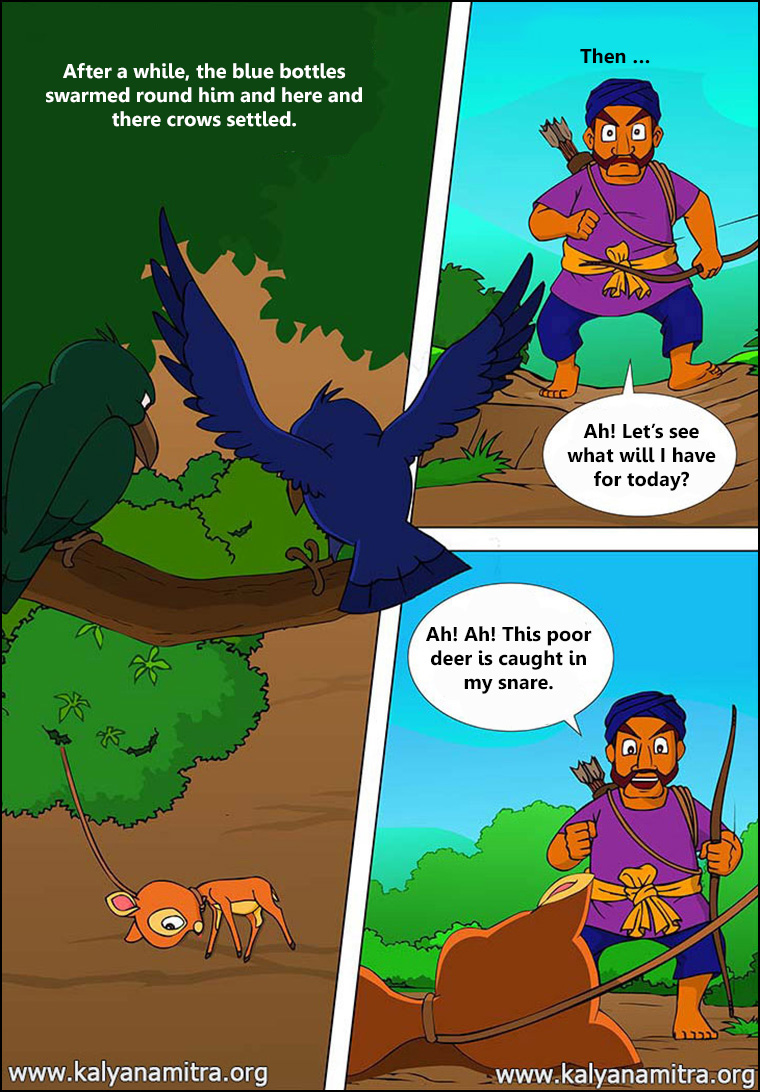
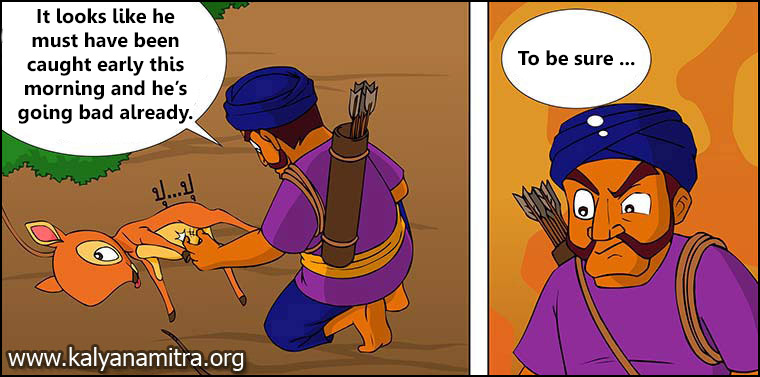
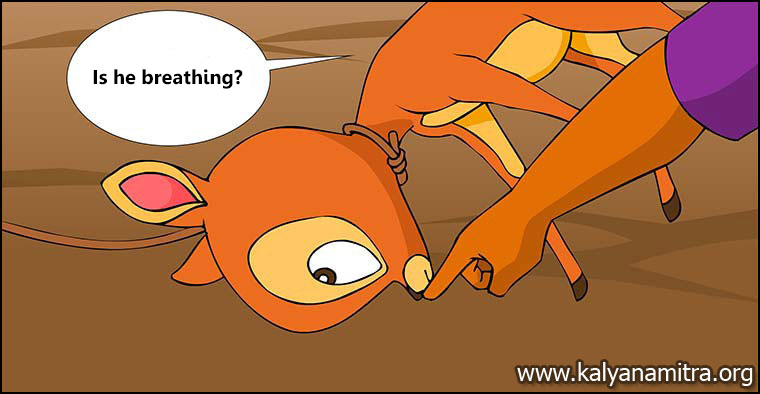
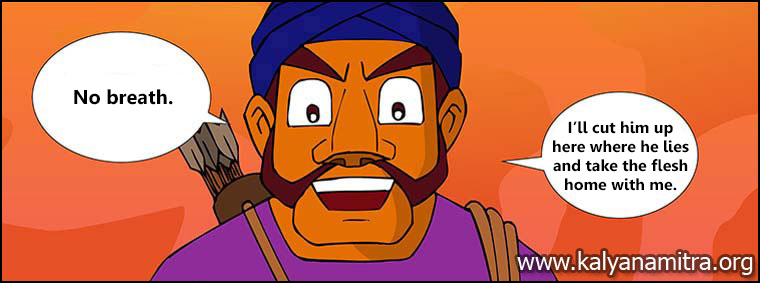
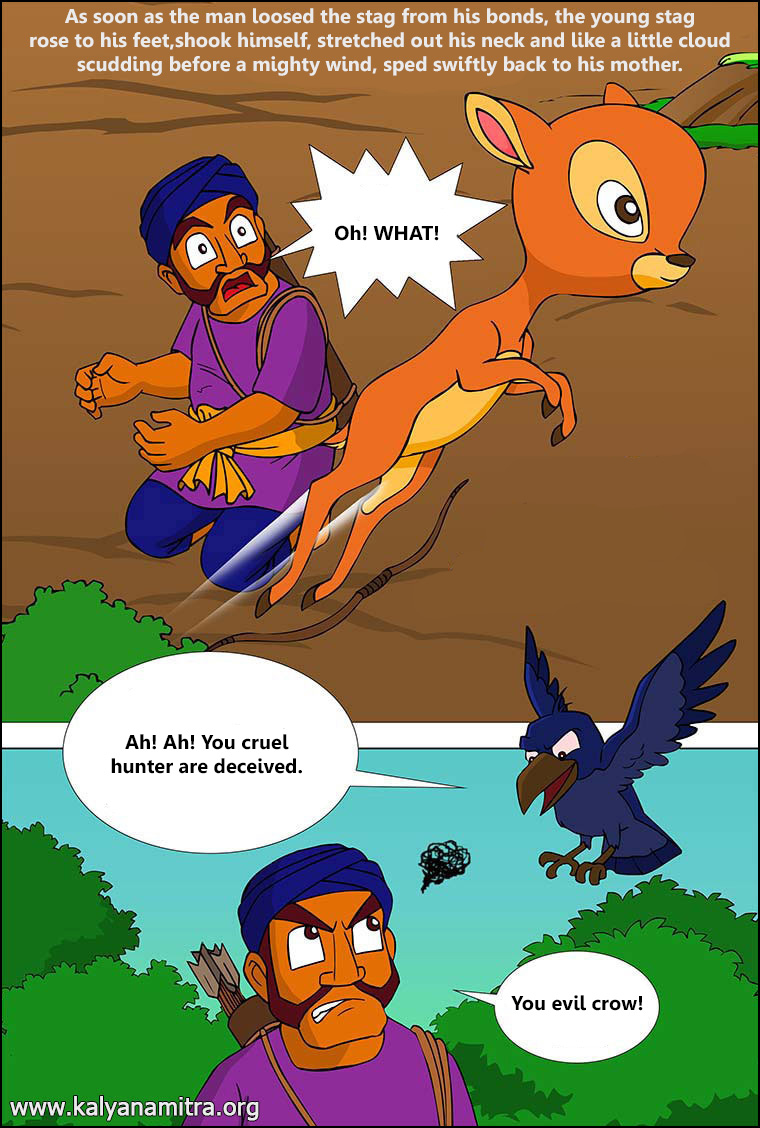
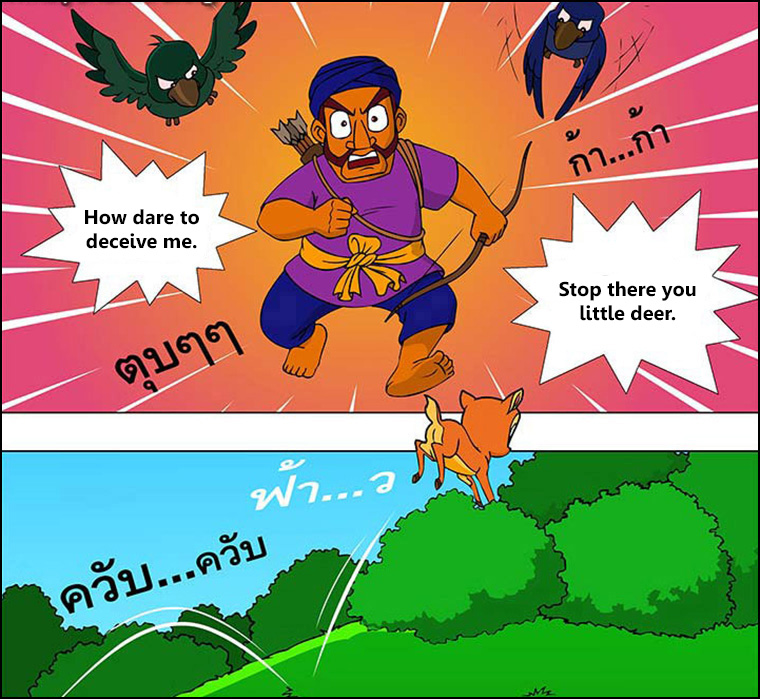
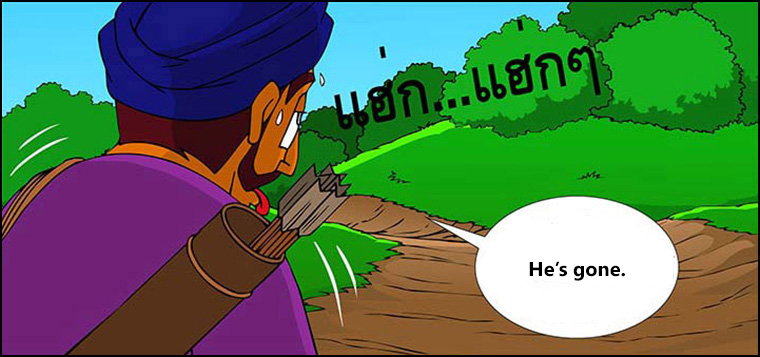
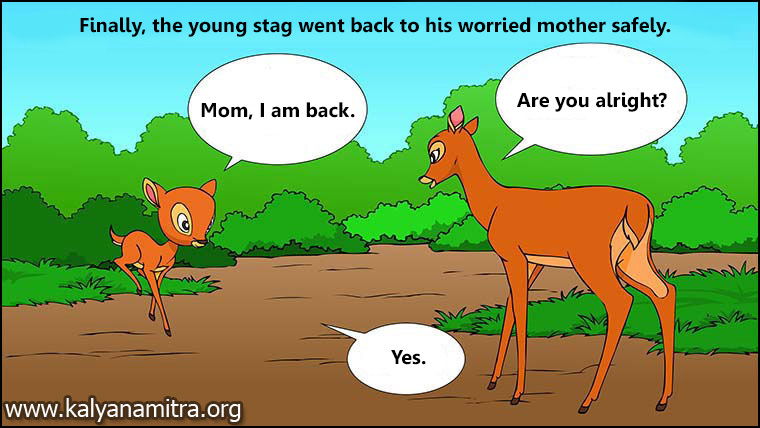
TIPALLATTHAMIGA-JATAKA
The Origin of the Story
This story was told by the Lord Buddha while was dwelling in the Badarika monastery in Kosambi about Venerable Rahula whose heart was set on observing the rules of the Order. Once when the Lord Buddha was dwelling in the Aggalava temple hard by the town of Alavi, many Bhikkhus followed him to the place causing the resident shelters were not enough to accumulate the monks and the Buddha had laid a rule: If a Bhikkhu sleeps in the company of novices, it is a Pacittiya offence (requiring confession and absolution).’
Thereon the monk said to the Venerable Rahula, ‘Sir, the Blessed One has laid down this precept and now you will please find quarters of your own.’ Now, before this, the Bhikkhus, out of respect for the father and because of the anxious desire of the son to observe the rules of the Order, had welcomed the youth as if the place were his;—they had fitted up a little bed for him and had given him a cloth to make a pillow with. But on the day of this story they would not even give him house room so fearful were they of transgressing. The excellent Rahula went neither to the Buddha as being his father nor to Venerable Sariputta as being his preceptor, nor to Venerable Moggallana as being his teacher, nor to the Venerable Ananda as being his uncle but betook himself to the Buddha’s jakes and took up his abode there as though in a heavenly mansion.
Now in a Buddha’s jakes the door is always closely shut: the levelled floor is of perfumed earth; flowers and garlands are festooned round the walls and all night long a lamp burns there. But it was not this splendor which prompted Rahula to take up his residence here, but it was simply because the monks had told him to find quarters for himself and because he reverenced instruction and yearned to observe the rules of the Order. And it was solely this anxiety which made him take up his dwelling in the jakes.
Now, though day had not yet dawned, the Buddha halted at the door of the jakes and coughed ‘Ahem.’ ‘Ahem,’ responded Venerable Rahula. ‘Who is there?’ said the Buddha. ‘It is I, Rahula,’ was the reply and out came the young novice and bowed low. ‘Why have you been sleeping here, Rahula?’
‘Because I had nowhere to go to. Up till now, sir, the monks have been very kind to me but such is their present fear of erring that they won’t give me shelter any more. Consequently, I took up my abode here because I thought it a spot where I should not come into contact with anybody else.’
Then thought the Lord Buddha to himself, ‘If they treat even Rahula like this, what will they not do to other youths whom they admit to the Order?’ And his heart was moved within him for the truth. So, at an early hour he had the monks assembled and questioned Venerable Sariputta thus,
‘I suppose you at all events, Sariputta, know where Rahula is now quartered?’
‘No, sir, I do not.’
‘Sariputta, Rahula was living this day in the jakes. Sariputta, if you treat Rahula like this, what will not be your treatment of other youths whom you admit to the Order? Such treatment will not retain those who join us. In future, keep your novices in your own quarters for a day or two and only on the third day let them lodge out, taking care to acquaint yourself with their lodging.’ With this rider, the Buddha laid down the precept.
Gathering together in the hall of truth, the monks spoke of the goodness of Rahula. ‘See, sirs, how anxious was Rahula to observe the rules. When told to find his own lodging, he did not say, ‘I am the son of the Buddha; what have you to do with quarters? You turn out!’ No; not a single brother did he oust but quartered himself in the jakes.’
As they were talking thus, the Lord Buddha came to the hall and took his seat on his throne of state, saying, ‘What is the subject of your talk, Bhikkhus?’
‘Sir,’ was the reply, ‘we were talking of the anxiety of Rahula to keep the rules, nothing else.’ Then said the Buddha, ‘this anxiety Rahula has shown not only now but also in the past, when he had been born an animal.’ And so saying, he told this story of the past.
The story of Jātaka
Once on a time, a certain king of Magadha was reigning in Rajagaha and in those days the Bodhisatta, having been born a stag, was living in the forest at the head of a herd of deer. One day his sister brought her son to him, saying, ‘Brother, teach your nephew here the ruses of deer.’
‘Certainly.’ said the Bodhisatta; ‘Go away now, my boy and come back at such and such a time to be taught.’ Punctually at the time his uncle mentioned, the young stag was there and received instruction in the ruses of deer.
One day as he was ranging the woods, he was caught in a snare and uttered the plaintive cry of a captive. Away fled the herd and told the mother of her son’s capture. She came to her brother and asked him whether his nephew had been taught the ruses of deer. ‘Fear not; your son is not at fault,’ said the Bodhisatta. ‘He has learnt thoroughly deer’s ruses and will come back straightway to your great rejoicing.’
Thus did the Bodhisatta console his sister by showing her how thoroughly her son had mastered the ruses of deer. Meantime the young stag on being caught in the snare did not struggle but pawed up the ground round his hoofs so as to shower the grass and earth about and lay down at full length on his side with his legs stretched out taut and rigid; relieved nature; let his head fall; lolled out his tongue; be slavered his body all over; swelled himself out by drawing in the wind; turned up his eyes; breathed only with the lower nostril, holding his breath with the upper one; and made himself generally so rigid and so stiff as to look like a corpse. Even the blue-bottles swarmed round him and here and there crows settled.
The hunter came up and smacked the stag on the belly with his hand, remarking, ‘He must have been caught early this morning; he’s going bad already.’ So saying, the man loosed the stag from his bonds, saying to himself, ‘I’ll cut him up here where he lies and take the flesh home with me.’ But as the man guilelessly set to work to gather sticks and leaves to make a fire with, the young stag rose to his feet, shook himself, stretched out his neck and, like a little cloud scudding before a mighty wind, sped swiftly back to his mother.
The revealing of the identities
After repeating what he had said as to Rahula’s having shown no less anxiety in time past to keep rules than in the present, the Lord Buddha made the connection and identified the birth by saying, ‘Rahula was the young stag of those days, Uppala-vanna, his mother and I the stag his uncle.’
What are learned from the story:
1. To spend over night with other fellows, it is important to consider others’ interest.
2. To acquire any knowledge, it is important to study it until mastering it and enabling to benefit from it.
3. To be skillful in any knowledge, it is important to following the teacher’s meticulously instruction and with enthusiasm.
The End